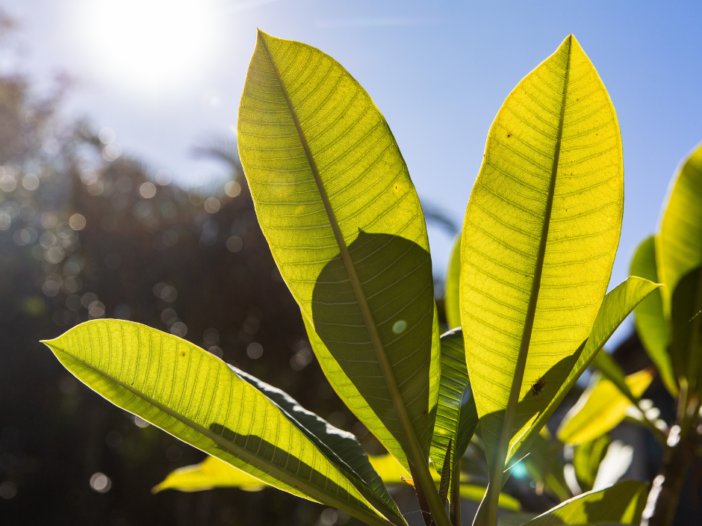
In this summer of extreme heat and little rain, you may be tempted to grab a hose, saturate your yard, and make up for what Mother Nature hasn’t delivered.
Hold the spigot.
Plant Health Manager Cameron Cole and Irrigation Technician Noah Briscoe explain how the weird weather is affecting plants and how to care for your yard in these conditions.
1. Don’t overwater
“Too much water is just as dangerous as not enough,” Cole says. Saturating your plant beds could induce root rot. “It’s just like us: We need moisture, we need to drink, but if we drink too much, we’re going to have issues. It’s all a balance.”
“Too much water coming in,” adds Briscoe, “could drain the nutrients too fast.” In hydrating your plants, you might starve them instead.
It’s hard to give general rules on how much water is enough, but Cole and Briscoe say an inch a week should be adequate for most plants. If your irrigation system doesn’t have a rain gauge, you might want to purchase one and monitor rainfall amounts — or how much water your irrigation system delivers when running.
2. Monitor your plants
Pay attention to your plants, and your plants will tell you what they need. The leaves of dehydrated plants will wilt or furl, a clear signal for the watering can. Some plants may require more than that average inch per week, depending on species, light conditions, and other factors. Potted plants dry out faster than in-ground ones and should be watered at least once a day. Be certain the pots drain; standing water will rot the roots.
At the Garden, Briscoe hasn’t adjusted the irrigation schedule to account for this summer’s conditions. It’s not necessary, he says. Instead, horticulturists hand water stressed plants or ask him to adjust irrigation zones if needed.
You might also want to keep an eye out for signs of fungus, such as spotting on leaves. The high humidity can spur its growth. Treating fungi is complicated; consult with a landscaping professional for assistance.
3. Timing is everything
Watering midday is water wasted. More than half of what you give the plants will be lost to evaporation. Water first thing in the morning or, better yet, in the evenings.
4. Be mindful of lost tree cover
If you lost trees during Hurricane Ian (or for any other reason), the plants that grew beneath them may need a little TLC this summer. That’s because they were acclimated to shady conditions. Now exposed to a relentless summer sun, the leaves may look as if they are burning.
Consider staking a beach umbrella over them during the hottest part of the day to give them some relief. Make sure you allow them sunlight in the mornings and late afternoons so they can continue to photosynthesize.
5. Add mulch
Mulch traps moisture. Cole and Briscoe recommend 3 inches of mulch in your plant beds.
“It acts as a sponge,” Cole says. “The mulch slows evaporation and locks water in.”
6. Don’t shock your lawn
Even with this summer’s unusual rain patterns, lawns still grow quickly. As hard as it is to work outside in record heat, try not to let the grass grow too high and then shave several inches at once. That extreme cut stresses grass. Aim to maintain your lawn at 2 to 3 inches.
7. Avoid fertilizing
A typical Southwest Florida rainy season brings quick afternoon showers on a near-daily basis. Storms this summer have been infrequent but heavy when they occur, dumping lots of water all at once.
“That’s really bad for topsoil and nutrient erosion,” Cole says.
The Garden avoids using nitrogen and phosphorus-based fertilizers in the summer. When these nutrients wash into waterbodies in excess, they can fuel algae growth.
8. Favor perennials and native plants
This summer’s extremes may prompt you to rethink your landscape. Annuals will take the hardest hit during droughts or extreme heat. Well-established perennials may fare better. Native plants or plants from the Caribbean region, which have similar growing conditions, are also good choices because they tend to be more drought tolerant.

About the Author
Jennifer Reed is the Garden’s Editorial Director and a longtime Southwest Florida journalist.

